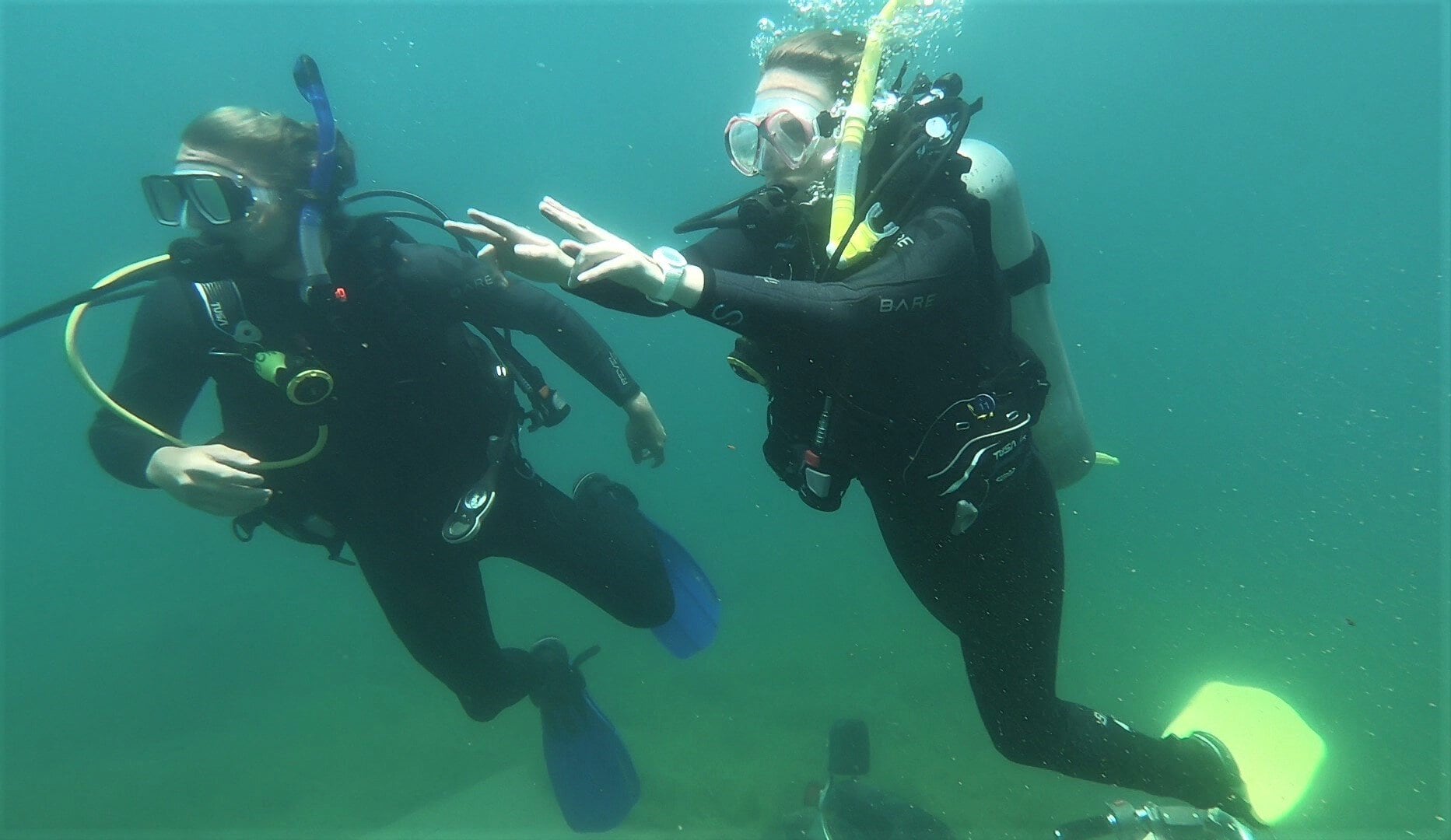GMC News
GMC Biology Club Students Discover Rare Fish Species During Panama City Beach Dive


GMC Biology Club Students Discover Rare Fish Species During Panama City Beach Dive
Georgia Military College (GMC) Biology Club students had no idea that they’d make an incredible discovery during their summer diving expedition off the coast of Panama City Beach, FL. Led by Professor Mark Fairbrass, who serves as GMC’s Health and Natural Science Department Chair, the group of four students identified the species of fish, the regal demoiselle, which was previously unrecorded in the Gulf of Mexico.
“It wasn’t the fact that we found something new,” Fairbrass said, “it was the fact that the kids found it. They were interested enough to say, what is this? They were interested enough to push that out to other groups and to find the answer.”
The Regal Demoiselle, native to the Indo-Pacific region, was first thought to be an anomaly in the Gulf. However, after consulting with other biologists, it was revealed that the species had been spotted in the Gulf before, primarily on the legs of oil rigs transported from the Pacific. This was the first time, however, that the fish had been observed on the wrecks the GMC team explored off the Florida coast.

Fairbrass is a fierce advocate of GMC’s mission to provide opportunities to students who are looking for ways to demonstrate value to future employers and graduate programs. “These students are amazing because they don’t take it as a vacation to go diving,” Fairbrass said. The students meticulously filled out forms and submitted photographs to REEF (Reef Environmental Education Foundation) and the U.S. Geological Survey to record the species’ presence, making a lasting impact on the region.
GMC’s Biology Club offers students hands-on experience in the field, and Fairbrass goes all in for his students by fundraising for the diving trips himself, which are part of an ongoing research effort over that past two years, allowing students to observe and document marine life, contributing to scientific knowledge and gaining valuable skills for their future careers.
The Biology Club’s trips are funded through donations, have become an essential part of the students’ education. Professor Fairbrass emphasized the importance of these experiences in helping students stand out when applying for graduate programs or jobs. “The whole point is to get kids out of the classroom and give them real-world experience,” he said. “When they finish with GMC, they have the skills to say to any organization, ‘I really should be with you. Look at what I’ve done.’”
As the Biology Club plans to make these trips an annual tradition, they continue to seek support to ensure that more students can participate and make discoveries of their own. Those interested in contributing to the Biology Club’s efforts can do so through GMC’s donation portal at give.gmc.edu by donating to the ‘JC Biology Club’ fund. 
Georgia Military College’s Response to Hurricane Helene: Leadership in Action
When Hurricane Helene swept through Georgia, its impact was devastating—disrupting communities, displacing families, and leaving students facing unforeseen academic and financial challenges. In the face of adversity, Georgia Military College (GMC) exemplified its core values of leadership, duty, and service by taking immediate action to support its students, faculty, and affected communities. Providing Critical Support […]
Lt. Gen. William B. Caldwell Honored as One of Georgia Trend’s Most Influential Leaders
Lt. Gen. William B. Caldwell Honored as One of Georgia Trend’s Most Influential Leaders Lt. Gen. William B. Caldwell, President of Georgia Military College, has been recognized as one of Georgia Trend’s “Georgia 500: Georgia’s Most Influential Leaders” for 2024. This prestigious honor celebrates leaders across the state who are making a significant impact in […]
A Message from President Caldwell on Law Enforcement Appreciation Day
On this National Law Enforcement Appreciation Day, Georgia Military College proudly extends its heartfelt gratitude to the men and women in law enforcement who dedicate their lives to protecting and serving our communities. Your commitment to the safety and well-being of others embodies the highest ideals of service, sacrifice, and integrity. Today, we honor you and reflect […]
Georgia Military College and Wiregrass Georgia Technical College Unite to Expand Educational Opportunities
Georgia Military College (GMC) and Wiregrass Georgia Technical College (WGTC) are transforming higher education opportunities in Georgia through a new transfer agreement. This partnership empowers Wiregrass graduates with an Associate of Applied Science degree or other associate degrees to seamlessly transition into GMC’s Bachelor of Applied Science (BAS) programs offered through the Global Online Leadership […]
GMC Football: A Historic 2024 Season for the Junior College Bulldogs
The 2024 season was one for the history books for Georgia Military College (GMC) Football, also known as the Junior College Bulldogs. With a 10-2 record, a pivotal game on historic Davenport Field broadcast on ESPN+, and a berth in the NJCAA Semi-finals for the first time since 2013, the Bulldogs showed resilience, talent, and […]
GMC Bulldogs Charge Into NJCAA Football Semi-Finals Scheduled for ESPN+ Live at Davenport Field on December 8th
Against all odds and with a bold new playbook, the Georgia Military College (GMC) Bulldogs have stormed their way into the NJCAA National Semi-Finals to take place on GMC’s Historic Davenport Field on December 8th, at 3:30pm. The game will also be broadcast live on ESPN+ . This remarkable achievement underscores the resilience, innovation, and […]
Georgia Military College Junior College Athletics: A Season of Triumphs
Junior College Athletics Shine Bright in Fall Competitions Georgia Military College (GMC) Junior College Athletics has delivered an exceptional fall season, celebrating standout performances across football, soccer, and cross country. We stand proudly behind our exemplary athletics programs, which reinforce GMC’s reputation as Georgia’s premier leadership academy, cultivating excellence both on and off the field. […]
A Message from President Caldwell on Veterans Day
A Message from President Caldwell on Veterans Day Every Veterans Day, I take a moment to think about who we are celebrating. Who are the people we call veterans? The truth is, there are as many military service stories as there are people who have served. Many enlist because of a tradition of service in […]
Georgia Military College Celebrates Alumni Weekend 2024 with Unforgettable Events and Enduring Connections
A Memorable Celebration of GMC’s Legacy: Alumni Weekend 2024 From October 24-26, 2024, Georgia Military College (GMC) welcomed alumni from all walks of life for an inspiring Alumni Weekend. This year’s theme, “Remember When, Experience it Again,” captured the unique spirit of GMC, a place where past and present unite to build connections that shape […]
Georgia Military College Hosts Annual Ethics Bowl, Sends Two Teams to Nationals
On Friday, October 18, 2024, the Georgia Military College (GMC) Junior College Corps of Cadets gathered for the annual Ethics Bowl, a key event that fosters critical thinking and ethical reasoning in future leaders. As a leading leadership institution, Georgia Military College emphasizes the importance of character development and ethical decision-making in shaping responsible leaders. […]
26th Secretary of Defense General James Mattis Engages Students at Georgia Military College’s Leadership Speaker Series
Laying a Strong Foundation On an overcast September morning, the 26th Secretary of Defense, General James “Jim” Mattis, was greeted by Georgia Military College President General William B. Caldwell, IV, at the South Gate of the GMC Campus. Behind them, uniformed cadets knelt on the brick walkway leading to the Old Capitol Building, inscribing the […]
A Message from President Caldwell on Constitution and Citizenship Day
Every year on September 17th our nation is blessed as we honor and celebrate our Constitution and Citizenship Day. On this day we are reminded of the enduring significance of the United States Constitution—a document that has shaped the fabric of our nation since its inception. It is more than just a set of laws; […]
A Message from President Caldwell on Patriot Day
On September 11, 2001, our country was forever changed. In the span of a few short hours, the world witnessed both the worst of human depravity and the very best of our American spirit. On that day, nearly 3,000 of our fellow citizens lost their lives in a cowardly attack on our nation. But in […]
Georgia Military College to Host Full Week of Events to Celebrate Patriot Day
Georgia Military College (GMC) will host a week-long series of events to honor Patriot Day, transforming the traditional observance into a full week of celebrations. These events will pay tribute to the nation’s heroes and highlight GMC’s commitment to leadership, patriotism, and community engagement. The week will culminate in a First Responders themed football game […]
Georgia Military College Celebrates the Legacy of Leadership of President Lieutenant General William B. Caldwell, IV, USA (Ret)
Georgia Military College (GMC) announces that this will be the final year Lieutenant General William B. Caldwell IV, USA (Ret) will serve as the 21st President of GMC. Lieutenant General Caldwell assumed the role of President in November of 2013 after a decorated 37-year career in the United States Army. He plans to continue his […]
GMC Biology Club Students Discover Rare Fish Species During Panama City Beach Dive
GMC Biology Club Students Discover Rare Fish Species During Panama City Beach Dive Georgia Military College (GMC) Biology Club students had no idea that they’d make an incredible discovery during their summer diving expedition off the coast of Panama City Beach, FL. Led by Professor Mark Fairbrass, who serves as GMC’s Health and Natural Science […]
Georgia Military College Dean’s List and President’s List – Summer Term 2024
Georgia Military College Dean’s List and President’s List – Summer Term 2024 At Georgia Military College, we are committed to academic excellence and recognize our students’ hard work and dedication through the Dean’s List and President’s List honors each term. These honors are a testament to the students’ hard work and the support provided by […]
A Message from President Caldwell on Independence Day
On this Fourth of July, as fireworks light up the sky and the echoes of patriotic anthems fill the air, we find ourselves not only commemorating our nation’s birth in 1776, but reflecting on the enduring principles that have carried us forward. It is a day of gratitude for the liberties and freedoms we enjoy, […]
Admiral Michael G. Mullen Offers Inaugural Keynote Address at NewDayUSA Center of Leadership at Georgia Military College
Admiral Michael G. Mullen Offers Inaugural Keynote Address at NewDayUSA Center of Leadership at Georgia Military College GMC students and community preview state-of-the-art leadership facility designed to convene renowned experts in business, military, diplomacy, sports, and entertainment. Admiral Michael Glenn Mullen (USN, ret.), who served as the 28th Chief of Naval Operations from 2005–2007 and […]

